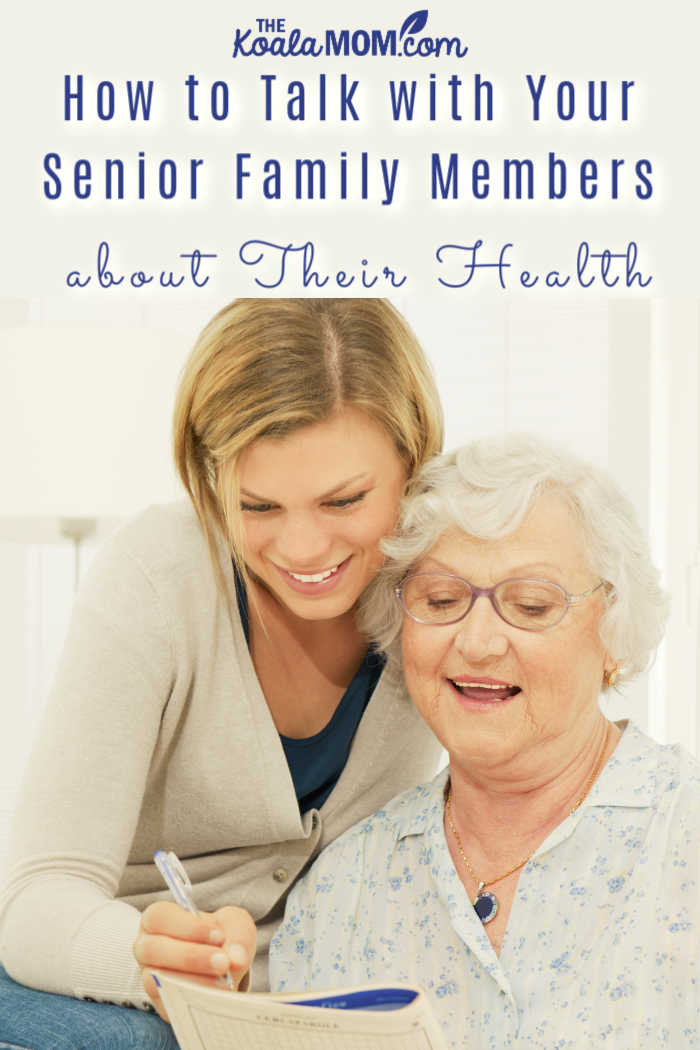The oldest and youngest members of our families tend to be the most vulnerable to colds and flus. Babies have yet to develop strong immune systems to fight off viruses, and grandparents often have naturally weaker immune systems on account of their age. Back-to-school season, with its changing weather and activities, is a great time to think about protecting the health of all family members. Here’s my tips on why and how to talk with your senior family members about their health.

This is a sponsored post brought to you by Sanofi Pasteur; all opinions expressed remain my own (and I appreciate the opportunity to write about a topic near and dear to my heart). This post contains affiliate links; as an Amazon associate, I earn from qualifying purchases.
How to Prepare for the Flu Season
Colder weather and the start of school activities mean that kids are gathering once again in groups indoors. It’s the perfect time for cold and flu viruses to spread, as many of us know too well. As moms, we may stock up on our favourite anti-flu remedies and take our kids for their booster shots.
We’ll probably remind them to wash their hands frequently at school and extracurricular activities. We might tuck some anti-bacterial handwash into their backpacks, in the vain hope that they’ll remember to use it. Kleenex packs also make it onto the list of back-to-school supplies, even as we warn our kids, “If you cough or if you sneeze, use your elbow, if you please!”
It’s just as important to talk to our parents and grandparents about what they’re doing to prevent the flu and stay protected this flu season. Most of us don’t like to think about our parents aging and facing greater health concerns. The reality is that seniors have an increased chance of catching the flu (and other viruses), and developing complications from those illnesses.
That’s why it’s so important to ensure our senior loved ones are vaccinated. We all know that prevention is the best medicine, and in the case of seniors, having the right protection is an important part of that.
Due to weakening immune systems, adults 65 and older have lower responses to infections, greater susceptibility to the flu, and are at high risk for complications or hospitalization if they do get the flu. Although the standard flu vaccine is approximately half as effective in seniors as in younger healthy adults, there’s a higher dose version of the flu shot designed for those who are 65 and over. Some groups in BC are now urging care providers to make the higher dose vaccine available to all seniors living in long-term care.
You can find out if the higher dose vaccine is covered in your province by visiting fluzone.ca or speaking to your health care provider.
Discussing health with your parents or grandparents doesn’t need to be a big, scary conversation. If you’ve taken your kids for their vaccines, mention it to your relatives and ask if they are prepared for flu season this year. Maybe you could tell a silly story about something one of your kids did with their hand sanitizer or Kleenex. Right now, Pearl’s habit is to wipe her runny nose on the bottom of her shirt. I’m working on reminding her to ask for a Kleenex instead!
Being in the flurry of school activities and cooler weather, I’m stocking up on my favourite cold and flu remedies. This can be as simple as chicken noodle soup and lemon ginger tea, but also includes over-the-counter medicines for dealing with illness. If you’re shopping for yourself, grab a few extra boxes of soup or tea to create a care package for your elderly loved one.
While my grandpa did his grocery shopping up until the day of his accident (which happened at the grocery store), I know he kept it simple. He lived on frozen dinners and packaged cookies much of the time. I wished I lived closer so I could make him home-cooked meals, and even tried to figure out how I could do some batch cooking for him at my mother-in-law’s while we were visiting. I never made that happen, but I could have sent him some healthy soup mixes to keep his spirits up.
Keep in Touch
It’s also important that we keep in touch with our elderly loved ones. As a mom, I know how easy it is to get busy with the kids’ activities and find that weeks have passed since the last time I picked up the phone to call my parents (or grandparents, before they passed). Now that my parents and brothers have smartphones, we often text teach other quick messages. Nothing replaces a phone call, however, for asking, “How are you doing? really?”
An unfortunate reality of today’s society is that many seniors live isolated, lonely lives. My grandparents were blessed to have each other and to have an active church community, as well as friends who lived in their condo building. My grandpa continued to play cards with his neighbours and to drive to see my uncle and my brother when they were working on the farm (just outside town). He also visited my grandma daily after she went into her care home.
But when a senior gets sick, the consequences can be devastating and long-lasting, and have an impact on their independence, preventing them from doing the things they love. Seniors’ loss of independence and ability to care for themselves after the flu also has immeasurable repercussions for their families and the community. For my own grandpa, this could have impacted his ability to visit my grandma and spend time with his friends and church community.
These visits can be used to encourage exercises for enhancing mental wellness in seniors so that they can retain their cognitive function and emotional well-being. Regularly incorporating activities such as light physical exercise or memory games during these visits not only improves their mood but also strengthens their connections with loved ones and the community.

If your parents or grandparents live far away (as mine do), try to schedule a regular phone or video-chat date. Have your children send cards and artwork. When I was a child, I maintained a close relationship with my step-grandma and great-aunt in Ontario via Canada Post. Letters flew back and forth between us about many topics, from my grandma’s dog’s antics to her health.
You can also text or email pictures of the kids and their activities. My in-laws have spotty cell service on their farm, but my mother-in-law sends me little notes when she’s out running errands about their activities. I try to respond with similar notes about our activities. It’s a small way to be involved with each other’s lives, but it’s nice to think about her heading off to quilting while I’m taking the kids to the library.
My brother has a hands-free phone in his truck and often calls me (or our parents) when he’s on the road for work. I’ve adopted that same habit, taking my earbuds when I’m in the van alone so I can catch up with a loved one too.
Keeping in touch with your family members makes it easier to bring up topics like their health. Don’t assume they’ve gotten the flu shot or seen their doctor recently; ask them. We all need reminders to take care of ourselves. According to this dentist who does teeth cleaning and tooth extraction in Naples FL, you can also ask someone near their place to check up on them every once in a while.
If you are lucky enough that your parents or grandparents live close by and can be involved with your family, as many of the “Give Back Generation” are, it’s still important to have this conversation with them. They could catch that cold or flu your child brings home from school, and they may not recover as quickly as your child. It’s worth remembering that the flu vaccine can reduce the severity of infections and prevent hospitalizations.

Do you talk with your senior family members about their health?
